Bridgerton: Everything you need to know about the Netflix drama
 NETFLIX
NETFLIXNetflix's new period drama Bridgerton, which launches on Christmas Day, has been described as a Regency-era Gossip Girl.
And you can see why. It's narrated by the mysterious Lady Whistledown, who writes regular newsletters full of tittle-tattle about the dating exploits of high society. Everyone reads her well-informed takes with fascination - but nobody knows who she is.
The year is 1813, and Daphne Bridgerton is making her debut in London in the hope of finding a suitable husband. Things are made challenging by her older brother, whose discerning eye stops most male candidates from getting very far.
"She's the eldest daughter of the Bridgerton family," explains actress Phoebe Dynevor, "and she conforms to all these crazy social rules and expectations which are placed on women, but also men, in those times. But she's very young and naive, and she's about to find out that the world isn't quite as she imagined it to be."
So, that's the premise. Here's everything else you need to know:
1. It's based on the best-selling romance novels
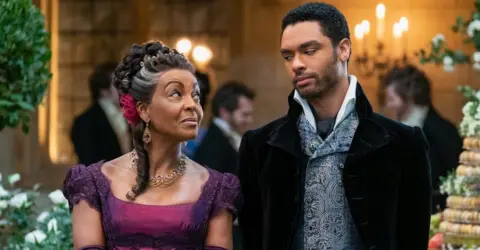 NETFLIX
NETFLIXThe eight-part drama has been adapted from Julia Quinn's series of Bridgerton novels. They've sold more than 10 million copies in the US alone and been translated into 32 languages worldwide.
But there's a decent chance you've never heard of them, which could partly be due to a certain snobbery that exists towards the genre.
"I think that's a common thought, that people look down their noses at romance novels," says showrunner Chris Van Dusen. "I personally don't understand why that is. I don't think that it's the same with other genres. But at the end of the day, these books are filled with compelling characters and interesting stories."
Derry Girls star Nicola Coughlan, who plays Penelope Featherington, agrees: "I think they definitely can be [looked down upon], but that's part of the show's secret power in a way, because it's a genre that hasn't been explored much on television."
2. It's produced by one of the biggest names in TV
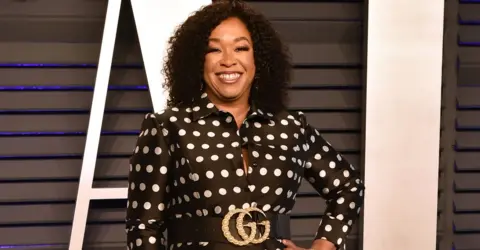 Getty Images
Getty ImagesShonda Rhimes isn't hugely well-known in the UK, but she's one of the most powerful execs in the US TV landscape, having created medical drama Grey's Anatomy and political thriller Scandal. She also wrote the Britney Spears film Crossroads, but nobody's perfect.
In 2017, Netflix signed Rhimes and her production company Shondaland to an exclusive deal worth a reported $150m (£110m), which has so far seen her develop Bridgerton and the forthcoming series Inventing Anna.
The deal was seen as a coup for Netflix due to Rhimes' close ties to ABC. Extraordinarily, the move came about because of a dispute Rhimes had with ABC's parent company Disney over some free family passes to Disneyland, according to The Hollywood Reporter.
Anyway, Rhimes has brought Van Dusen with her to oversee Bridgerton, because the pair go way back.
"We do, yes. I worked in Shondaland pretty much my entire writing career, since Grey's Anatomy," explains Van Dusen. "Prior to Bridgerton I was working on Scandal, and as that show was coming to an end, I was looking for what to do next. I knew I wanted to do something completely different to modern-day political intrigue in Washington DC, and that's when Shonda told me about Bridgerton."
3. The critical reception has been largely positive
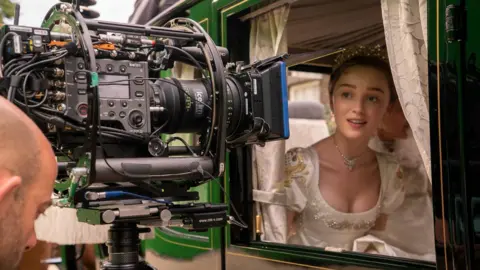 NETFLIX
NETFLIXNearly every critic has noted that Bridgerton's release is well-timed, arriving at the end of a ghastly 2020.
Vanity Fair's Sonia Saraiya described it as "frothy, silly escapism - the perfect Christmas offering for a craptastic year".
"It's a fun show, for a while at least; the escapism quotient is high," agreed Time's Judy Berman. But, she added: "If only the writing matched the production values."
Aja Romano of Vox was more critical, saying the show "comes off like many of the aristocrats it's skewering: soulless and vapid".
But the show's diverse cast was applauded by Vulture's Kathryn VanArendonk, who wrote: "Bridgerton a beguiling example of what can happen when romance is allowed to belong to characters who aren't all straight and white, and a fanfare-and-confetti reminder of what the genre can be at its best."
4. The 'Bridgerstans' are not to be messed with
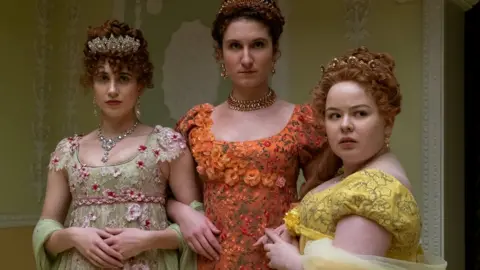 NETFLIX
NETFLIXAfter Coughlan was cast in the show, she "went lurking on the fan forums online", which is something only the bravest of actors would do.
"And I realised that the fans really loved Penelope, so I felt a lot of pressure and like I didn't want to let them down," she explains. "They really wanted Emma Stone to be cast, so I was like 'I'm really sorry that it's me!'"
Fortunately, they gave Coughlan the seal of approval. "They've been so lovely, when the casting got announced they couldn't be more sweet," she says. "But there's a huge fandom behind the series." Indeed, Coughlan's forum-mining came in rather useful to the other cast members.
"I think Nicola was definitely the spokesperson for the Brigerstans, as they call themselves," says Dynevor. "We'd go to Nicola if we had any fan questions." Dynevor, though, chose to avoid the forums ("for my own mental health"), adding: "There is quite a lot of pressure when there is already such a following."
5. The series is pure eye candy
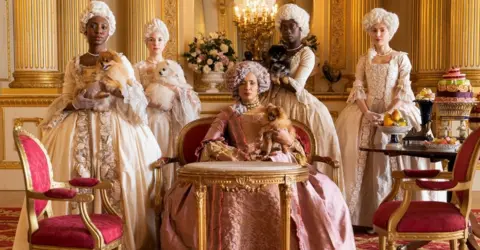 NETFLIX
NETFLIXBritish and American viewers are partial to a period drama, and the Regency period especially, because "it was a time of excess, beauty and decadence," according to Van Dusen.
"It was over the top. And I think that is why audiences love it so much. You have the dancing, the costumes, the jewels, the country homes, the glittering ballrooms, and I think all of that works to provide us an escape."
Coughlan says she's pleased such a "colourful and exciting" show is coming out at the end an otherwise miserable year. "We don't need a drab, grey period drama," she says, "Bridgerton is in full technicolour, so I think that will be nice for people."
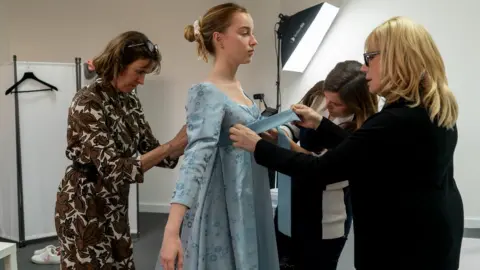 NETFLIX
NETFLIXIt's clear from the first few minutes of Bridgerton that a lot of time and effort went into the costumes, hair and make-up.
"The fitting process was a lot," admits Dynevor. "I had 104 dresses, all handmade from scratch which is pretty unheard of, the costume department was incredible. But also having to be fitted into the costumes - whenever I wasn't filming I was in a fitting."
But that wasn't the only time-consuming thing the stars had to do in preparation for shooting. Dynevor also had "horse riding lessons, dance lessons and etiquette lessons", in addition to learning all the lines. "But you had to throw yourself into it," she says.
6. There are parallels to today's dating culture
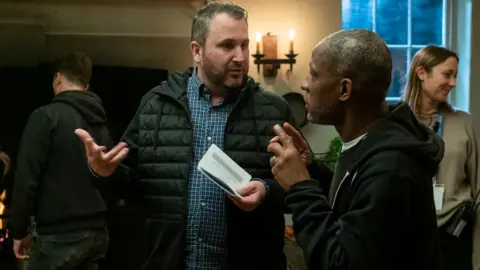 NETFLIX
NETFLIXCoughlan notes today's audience may feel a new appreciation for how far society as come since the 19th Century. "Eloise and Penelope are virgins who can't drive," she points out. "But it wasn't that long ago that young women still weren't told all of the facts of life.
"It's fascinating to see, even though times have changed, how much human nature persists. The same pressure applies in different ways. You see the pressure upon women to get married, and that's still around. You see the pressure on men to fulfil these stereotypical male roles within society and how people don't want to be part of that."
Van Dusen concludes: "Underneath all the glamour and the lavishness, there is this running modern commentary on the show about how, in the last 200 years, everything has changed but nothing has changed, I think that's true for both men and women.
"We explore things like family, sexuality, dating, they had courtship in Regency times, and instead of those dating apps like Tinder, they were effectively swiping left and right in ballrooms all night. Finding those modern references was something we had a lot of fun with."
